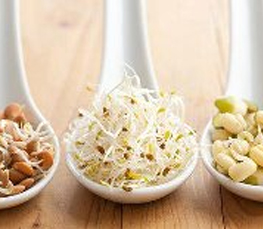SUPERFOODS: SPROUTING

Sprouting is a fantastic way to get lots of nutrients DIY style. Sprouting means the food remains raw and therefore enzymes intact. In fact, if you want to add more raw food to your cooking but found it overwhelming – sprouts are a good place to start. They are fun to do with kids too and excellent for their growing bodies and brains!
The choice of what you can sprout is big. Here is just a list:
Buckwheat, oats, Wheat, rye, quinoa, amaranth, alfalfa, barley, millet, corn, pumpkin seeds, sesame seeds, sunflower seeds, almonds, radish, fenugreek, mustard, cabbage, beans – adzuki, chickpeas, mung and lentil. Other legumes are hard to digest when raw so best avoided and not recommended for sprouting.
Directions for Sprouting – Using a Sprouter
- Soak whatever you are sprouting overnight in water – although some foods/seeds need less soaking and over-soaking spoils them. If buying proper sprouting seed packets you should find suggestions on the back of the packet.
Some rough guidelines are:
Buckwheat – 15 minutes
Amaranth – 12-14 hours
Oats, Barley, corn, rice, millet, wheat, rye, 8-14 hours
Quinoa 2-4 hours
Almonds 10-14 hours
Fenugreek 8-14 hours
Cabbage/kale 6-14 hours
Sesame, sunflower, radish, pumpkin, mustard 8-14 hours
Lentils, mung beans, adzuki 8-14 hours
- Sprinkle evenly onto the shelves – remove any odd looking/damaged seeds/beans etc
- Rinse twice a day, rejecting anything that looks as though it is rotting
- After 3-7 days they should be fully sprouted and ready to eat (see alfalfa warning below)
- Refrigerate afterwards – they should keep for about 5 days
Sprouting can be tricky if you do not keep the water flushing through the sprouter each day. They need attention. If you are going away for a few days, chances are your sprouts will not be happy once you come back. So best done when you can rinse them morning and evening.
Easy for Beginners:
Wheat, sunflower, almonds, lentil, mung and alfalfa.
We recommend using a pottery sprouter over a plastic one – but if that is all you can find, then that is fine. You can also use a jar
Some Cautions with Sprouting Alfalfa
Alfalfa becomes a grass when it has reached 3 – 6 inches (in other words when it has immature (primordial) leaves). Before this stage it is a sprout and will contain different chemical constituents. Sprouts eaten in excess and harvested before they are mature contain a small percentage of an amino acid analog called canavanine, which can make you sick or worsen other symptoms. The canavanine concentration is highest in the alfalfa seeds and decreases in concentration after the third day of sprouting. Because canavanine is water soluble, rinsing the sprouts each day also decreases the concentration. Alfalfa sprouts are best to eat when they are a rich green in colour and have their first division. At this stage they have minimal canavanine and do not cause any problems. This is usually around day seven.
Some nutrition…
Quinoa/amaranth – high in protein
Millet – soothing for the gastrointestinal tract
Seeds – excellent source of fibre, rich in minerals – zinc, selenium, magnesium, source of protein and essential fats
Beans – fibre, protein, good carbohydrate
Buy your Fresh Life Sprouter from www.totalhealthnowshop.co.uk . Click Here











